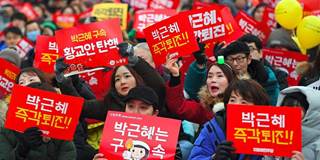At the heart of South Korea's political turmoil – in which the National Assembly has already the president impeached – is the reciprocal relationship between politicians and the giant family-owned conglomerates that dominate the economy. The government should take this opportunity to dismantle this decades-old system.
SEOUL – The indictment of Lee Jae-yong, the heir apparent at Samsung, is but the latest explosive development in the political scandal that has been rocking South Korea. Already, the National Assembly voted to impeach President Park Geun-hye, the daughter of former president Park Chung-hee, on December 9. The Constitutional Court now has six months to justify her permanent removal from office. Depending on its decision, a presidential election may be held in the next few months.
But, as Lee’s indictment demonstrates, more than the presidency is at stake in this crisis. At the heart of the scandal is the reciprocal relationship between politicians and the chaebols, South Korea’s giant family-owned conglomerates. If the government takes this opportunity to transform the economy’s chaebol-dominated structure, it would reshape the country’s economic future as well – for the better.
Park is accused of using her political influence to benefit her longtime confidante, Choi Soon-sil, who is charged with forcing the chaebols to funnel about 80 billion Korean won ($70 million) into two nonprofit cultural foundations that she effectively controlled. She is also suspected of interfering in various state affairs, including ministerial appointments and state visits, despite having no official position. Park is being ridiculed as Choi’s puppet.

SEOUL – The indictment of Lee Jae-yong, the heir apparent at Samsung, is but the latest explosive development in the political scandal that has been rocking South Korea. Already, the National Assembly voted to impeach President Park Geun-hye, the daughter of former president Park Chung-hee, on December 9. The Constitutional Court now has six months to justify her permanent removal from office. Depending on its decision, a presidential election may be held in the next few months.
But, as Lee’s indictment demonstrates, more than the presidency is at stake in this crisis. At the heart of the scandal is the reciprocal relationship between politicians and the chaebols, South Korea’s giant family-owned conglomerates. If the government takes this opportunity to transform the economy’s chaebol-dominated structure, it would reshape the country’s economic future as well – for the better.
Park is accused of using her political influence to benefit her longtime confidante, Choi Soon-sil, who is charged with forcing the chaebols to funnel about 80 billion Korean won ($70 million) into two nonprofit cultural foundations that she effectively controlled. She is also suspected of interfering in various state affairs, including ministerial appointments and state visits, despite having no official position. Park is being ridiculed as Choi’s puppet.